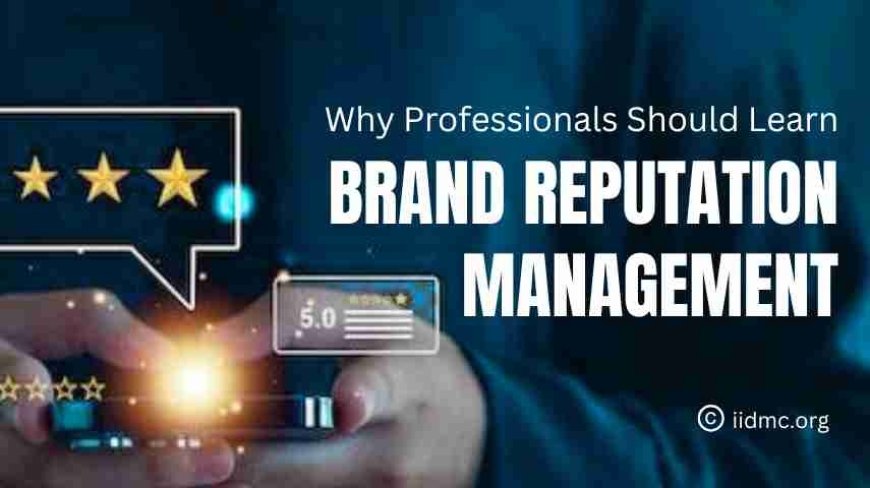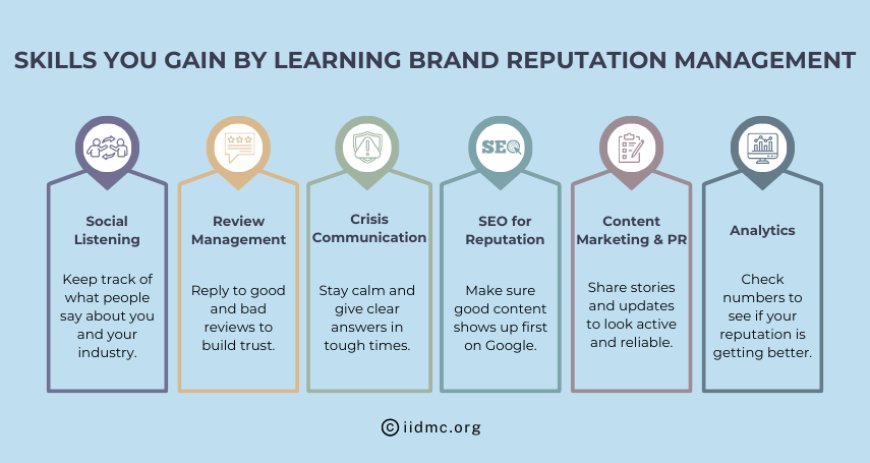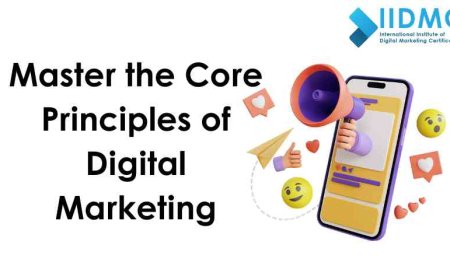Why Professionals Should Learn Brand Reputation Management
Professionals should learn brand reputation management to build trust, attract clients, grow career opportunities, and stay ahead in their field.

Reputation has always been important, and for a brand it can decide long-term success or failure. A quick online search, customer review, or social media mention often shapes how people view a business. Many times, potential buyers form opinions before they even interact with the brand directly. One negative review or viral complaint can damage years of hard work, while a strong and positive reputation can attract loyal customers, investors, and partnerships. This is why reputation is often called an “invisible asset”. It quietly influences public opinion and determines whether people choose your brand over competitors.
For professionals, learning brand reputation management is essential. It helps track what customers are saying, respond effectively to complaints, and build a trustworthy image that lasts. Strong reputation management not only ensures that achievements and values are recognized but also protects the brand from unfair criticism or misinformation. Whether it’s a startup, a growing company, or a well-established business, a positive reputation gives a competitive edge and can be the key to sustainable growth.
What is Brand Reputation Management?
Brand reputation management is about shaping and maintaining how people see you, your services, or your company. It focuses on building a positive image, protecting it during problems, and improving it over time. A strong reputation builds trust, while a weak one can block growth.
Main Parts of Brand Reputation Management
-
Monitoring: Watching what people say on social media, Google, reviews, forums, and news.
-
Responding: Replying to reviews or complaints politely and on time.
-
Building Trust: Sharing success stories, testimonials, and being honest.
-
Improving Image: Fixing weak areas, improving service, and posting useful content.
Two Types of Reputation Management
-
Personal Reputation Management: For professionals, freelancers, or students. A good personal image online (Google, LinkedIn, etc.) can help you get jobs, clients, and respect.
-
Corporate Reputation Management: For businesses. A company’s reputation impacts customer trust, employee satisfaction, and overall success. It includes reviews, social media, and transparent communication.
Why Reputation Matters in the Professional World
Reputation is not something you can see or touch, but it is one of the most powerful assets a professional can have. It shapes how people think about you and directly affects the opportunities that come your way.
-
Trust and Credibility: People like to work with professionals they can rely on. If you are known for being honest and dependable, more people will choose you over others.
-
First Impressions Online: Most employers, clients, and even colleagues check online profiles before making decisions. A clean and professional digital presence often matters more than what is written in a CV.
-
Career Growth: A good reputation helps you get noticed by recruiters, managers, or industry leaders. It makes you a preferred choice when promotions or special projects are available.
-
Customer Loyalty: For professionals running their own business or freelancing, reputation keeps customers coming back and recommending you to others.
-
Competitive Advantage: In industries with too many options, reputation becomes the key factor in decision-making. Clients or employers often choose the one with a stronger reputation even if skills are similar.
-
Networking Power: A positive reputation attracts strong professional networks. People are more willing to collaborate with or recommend someone who has a good standing.
Why Professionals Should Learn Brand Reputation Management
It is not enough to simply have skills; you also need to know how to protect and promote your reputation. One negative review, one careless post, or one bad interaction can quickly damage years of effort. That’s why every professional should learn brand reputation management.
-
Career Advancement: Employers are more likely to hire or promote professionals who know how to manage a company’s or personal image. It shows responsibility and leadership skills.
-
Entrepreneurs: Business owners cannot depend only on marketing or advertising. Customers trust businesses that have a good name. Learning this skill helps build long-term credibility without spending huge amounts on ads.
-
Freelancers: Clients want to work with people they can trust. A freelancer with a strong online presence, good testimonials, and a clean reputation can win projects more easily than others.
-
Leadership Growth: Managers and leaders are always under the spotlight. Knowing how to safeguard reputation makes them stronger role models and decision-makers.
-
Crisis Handling: Mistakes and problems happen, but professionals who can handle criticism, negative reviews, or online backlash with calm and clarity can save both their own and their company’s image.
-
Personal Branding: By learning reputation management, professionals can build a personal brand that sets them apart in the market. This is especially important for consultants, trainers, and experts.
-
Global Opportunities: A good reputation online can attract international clients, partnerships, or even job offers from abroad.
Skills You Gain by Learning Reputation Management
When you learn brand reputation management, you are not just learning a single skill; you are building a set of abilities that make you more valuable in any career.

-
Social Listening: This is like keeping your ears open online. It’s not just about tracking your name but also about noticing industry trends, customer opinions, and even competitor mentions. By doing this, you can spot problems early and also find new opportunities.
-
Review Management: Reviews influence decisions more than advertisements. Learning how to thank people for good reviews, solve issues from bad reviews, and show customers that you care makes a huge difference.
-
Crisis Communication: During difficult times, people look for clear and calm communication. If you can send the right message with empathy and facts, you can stop panic and even turn criticism into respect.
-
SEO for Reputation: Search engines are often the first place people check. By applying SEO strategies, you can make sure positive stories, blogs, and achievements appear at the top while negative ones are pushed down.
-
Content Marketing & PR: Sharing helpful blogs, customer stories, or press releases not only highlights achievements but also shows that you are active and trustworthy.
-
Analytics: Reputation management also involves tracking numbers — how many people are talking about you, what tone they are using, and whether opinions are improving or not. Analytics gives proof of your progress.
Common Challenges in Brand Reputation Management
Reputation management is powerful but not easy. Professionals often face challenges that test their patience and skill.
-
Handling Negative Reviews: Many people feel defensive when they see criticism. The real skill is in staying calm, thanking the customer for feedback, and offering a solution. Often, this approach turns negativity into loyalty.
-
Social Media Criticism: Social media spreads faster than anything else. One small issue can quickly become viral. Knowing how to reply quickly, politely, and with solutions can control the damage before it grows.
-
Fake News or Rumors: Sometimes, false information spreads online. If ignored, it may look like you’re hiding something. The better approach is to share clear facts, use trusted sources, and communicate openly.
-
Lack of Transparency: Brands or professionals who hide mistakes or avoid answering questions lose trust. Being transparent (even when admitting faults) earns more respect than pretending nothing is wrong.
Mistakes Professionals Should Avoid in Reputation Management
Many times, reputation is damaged not by outside problems but by how professionals respond. Avoid these mistakes:
-
Ignoring Negative Comments: Silence shows you don’t care. Always acknowledge feedback, even if you can’t solve the problem immediately.
-
Arguing With Customers Online: No matter who is right, public arguments make you look unprofessional.
-
Deleting Bad Reviews: Instead of hiding complaints, respond openly and show how you are fixing the issue.
-
Inconsistent Communication: If you say one thing on your website and another on social media, people lose trust.
-
Making False Promises: Over-promising and failing to deliver damages credibility permanently.
Industries That Benefit Most From Reputation Management
Every industry values reputation, but in some, it is the deciding factor between success and failure.
-
Healthcare: Patients check online reviews before trusting a doctor or hospital. A single bad review, if not addressed, can push patients to competitors.
-
Education: Schools and universities rely heavily on trust. Parents and students want to join institutions with a strong reputation for quality and honesty.
-
Hospitality: Hotels, restaurants, and travel services live and die by their reviews. Star ratings on Google or TripAdvisor directly affect bookings.
-
E-Commerce: Buyers rarely purchase products without checking ratings or seller feedback. A trusted seller can win repeat business without lowering prices.
-
Real Estate: Buying property is a big decision. Customers only deal with agents or companies they trust.
-
Financial Services: Banks, insurance firms, and advisors handle money — without trust, no one will use their services.
-
Technology: Software apps and tech companies depend on user ratings and feedback for success. Even one data breach can harm a reputation if not managed well.
How Professionals Can Start Learning Brand Reputation Management
Building this skill may sound complex, but anyone can start small and grow steadily.
-
Self-Learning: Start with free blogs, guides, and videos. Reading about real-life case studies shows how big brands handle reputation.
-
Enroll in Certification Programs: These give structured lessons, practical projects, and recognition that employers value.
-
Practice With Tools: Start with free tools like Google Alerts to track mentions of your name. Later, you can explore advanced tools like Hootsuite.
-
Build Your Own Brand: Your LinkedIn, personal website, or even a simple blog can be your test ground. Post helpful content, reply to comments, and observe reactions.
-
Learn From Communities: Join LinkedIn groups or forums where professionals share tips. Discussing real problems and solutions helps you grow faster.
Best Institute for the Brand Reputation Management Certification
Building and protecting a brand’s reputation has become one of the most important skills in the business world. Customers, investors, and even employees trust companies that maintain a strong and positive image. Because of this, many professionals and businesses are now looking for trusted digital marketing certification programs to learn reputation management. Among the options available, IIDMC (International Institute of Digital Marketing Certifications) stands out as one of the best institutes to gain expertise in this area.
Certification Offered by IIDMC
IIDMC offers the Certified Brand Reputation Management Specialist program. This certification is designed to help professionals, entrepreneurs, and businesses learn how to:
-
Monitor online conversations and brand mentions.
-
Manage customer feedback and online reviews effectively.
-
Handle crises and negative publicity with the right communication.
-
Build long-term trust with customers and stakeholders.
-
Use tools and strategies to improve and protect a brand’s image.
The program follows a practical approach with real-world examples, case studies, and assignments, making sure learners are ready to apply the knowledge in real business situations.
Why Choose IIDMC?
Choosing IIDMC for your certification comes with many benefits:
-
International Recognition: IIDMC certifications are respected globally, adding credibility to your career or business profile.
-
Practical Learning: The course is designed with case studies, assignments, and projects that reflect real challenges in brand reputation management.
-
Updated Curriculum: The program covers the latest tools, techniques, and strategies used in reputation management.
-
Flexible Learning: IIDMC offers online learning options, so you can complete the certification at your own pace.
-
Career Growth: Becoming a certified specialist helps you stand out in the job market, attract clients as a freelancer, or strengthen your own brand.
-
Global Opportunities: With IIDMC’s recognition, you can apply your skills and knowledge in different industries and countries.
Career Opportunities in Brand Reputation Management
As online presence becomes more important, career opportunities in this field are growing across industries.
-
PR Specialist: Builds and protects the public image of individuals or companies.
-
Digital Marketing Manager: Ensures consistent branding and reputation across all digital platforms.
-
Corporate Communications Manager: Handles internal and external communication for organizations.
-
Reputation Analyst: Studies online feedback, reviews, and social sentiment to measure brand perception.
-
Community Manager: Directly engages with customers on social media or forums to answer queries and build trust.
-
Crisis Communication Expert: Specializes in managing crises such as scandals, bad press, or viral criticism.
Reputation is one of the most valuable assets a professional can have, and learning brand reputation management ensures that this asset is protected and strengthened. By gaining skills such as monitoring online conversations, handling negative feedback, and building trust through transparency, professionals can safeguard their image and stand out in a competitive market. Whether you are an employee seeking career growth, a freelancer aiming to attract more clients, or an entrepreneur working to build your business, reputation management gives you the tools to handle challenges with confidence and turn opportunities into long-term success. In a world where perception strongly shapes decisions, learning this skill is not just helpful; it is essential.





























